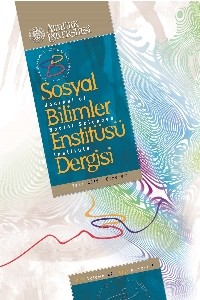Research Article
Year 2019,
Volume: 23 Issue: 3, 1033 - 1047, 15.10.2019
Abstract
Keywords
Project Number
-
References
- Abirached, Robert. (l994) (l978). La Crise du Personnage dans le Théâtre Moderne. Paris : Gallimard.Artaud, Antonin. (1985). Le Théâtre et son Double. Paris : Gallimard.Aizier, Arnaud. (2016). “Etude de la langue : quelles simplifications terminologiques et pourquoi?”, publié à la Page des Lettres du site Internet de l’académie de Versailles en septembre.Benveniste Emile. (1974) (1966). Problèmes de Linguistique Générale T.I. Paris : Gallimard, coll. “Tel”.Büyükahıska, Dilek ; Rüveyda H. Çebi (2018). “Yabancı Dil Öğrencilerinin Kelime Öğrenme Stratejileri Kullanım Sıklıkları”, Turkish Studies Educational Sciences, 13(19), 307-326.Delengaigne, Xavier. (2016). Mémoriser sans Peine ...avec le Mind Mapping: et Toutes Les Astuces pour Muscler et Donner de Bons Appuis à Votre Mémoire. Malakoff : InterEditions.Dujardin, Édouard. (1931). Le Monologue Intérieur. Paris : Messein.Durmuş, Mustafa. (2013). “İkinci/Yabancı Dil Öğretiminde Özgün ve Değiştirilmiş Dilsel Girdi Üzerine”, Turkish Studies. International Journal for International Periodical for the Languages, Literature and History of Turkish or Turkic 8(1): 1291-1306.Er, Ayten. (1998).Oyun Çözümlemesinde İlk Adım. Ankara: Ürün Yayınları.Genç, Hanife Nalan; Akdoğan, Sevinç. (2009). “La Théâtralité et Son Exploitation en Classe de FLE”, Atatürk Üniversitesi Kâzım Karabekir Eğitim Fakültesi Dergisi, Sayı: 19, 71-94.Ho, F. et S.-Y. Ho. (2002). “Le théâtre de création dramatique au service de l’enseignement des “humanities ” ”, Pédagogie collégiale, vol. 16, no 2, 29-32.Kamaruddin, Fadzliyati et Kamarul Kabilan, Muhammad. (2010). Engaging Learner’s Comprehension, Interest and Motivation to Learn Literature Using the Reader’s Theatre. English Teaching: Practice and Critique, 9(3), 132-159.Kargı, Birkan. (2014). “Yabancı Dil Öğretiminde Eylemsellik Bağlamında Öğrenen Odaklı Bakış”, Omü Eğitim Fakültesi Dergisi, 33(2), 357-366.Krashen, Stephen. (1982). Principles and Practice in Second Language Acquisition. Oxford: Pergamon Press.Larthomas, Pierre. (1980) (1972). Le langage Dramatique, sa Nature, ses Procédés. Paris : Presses Universitaires de France.Lordat, M. (1828). Du Dialogisme Oral dans L’enseignement Public de la Médecine, Montpellier : Jean Martel.MacFadden, Pamela. (2010). Using Theatre Arts to Enhance Literacy Skills at the Second Grade Level (Thèse de doctorat). University of California, Los Angeles, États-Unis. Neveux, Olivier. “Diction, théâtre”, Encyclopædia Universalis (en ligne), consulté le 29 avril 2019. URL : http://www.universalis.fr/encyclopedie/diction-theatre/Öztürk Dağabakan Fatma et Dağabakan Davut (2007). “Dil ve Çocukta Dil Gelişim Kuramları” Milli Eğitim Dergisi Sayı:174, Bahar, 155-161.Pavis, Patrice. (1987). Dictionnaire du Théâtre. Paris : Messidor.Pavis, Patrice. (2007). Vers une Théorie de la Pratique Théâtrale : Voix et Images de la Scène. 4e édition revue et augmentée, Presses universitaires du Septentrion, Villeneuve d’Ascq.Poyraz, Hakan (1995). Dil ve Ahlak. Ankara : Vadi Yayınları. Topaloğlu, Yusuf. (2017). “Acquisition du Subjonctif par les Etudiants Turcs” Humanitas, 6 (10): 333-361.Ubersfeld, Anne. (l982) (l997). Lire le Théâtre. Paris : Sociales.
Year 2019,
Volume: 23 Issue: 3, 1033 - 1047, 15.10.2019
Abstract
Supporting Institution
-
Project Number
-
Thanks
-
References
- Abirached, Robert. (l994) (l978). La Crise du Personnage dans le Théâtre Moderne. Paris : Gallimard.Artaud, Antonin. (1985). Le Théâtre et son Double. Paris : Gallimard.Aizier, Arnaud. (2016). “Etude de la langue : quelles simplifications terminologiques et pourquoi?”, publié à la Page des Lettres du site Internet de l’académie de Versailles en septembre.Benveniste Emile. (1974) (1966). Problèmes de Linguistique Générale T.I. Paris : Gallimard, coll. “Tel”.Büyükahıska, Dilek ; Rüveyda H. Çebi (2018). “Yabancı Dil Öğrencilerinin Kelime Öğrenme Stratejileri Kullanım Sıklıkları”, Turkish Studies Educational Sciences, 13(19), 307-326.Delengaigne, Xavier. (2016). Mémoriser sans Peine ...avec le Mind Mapping: et Toutes Les Astuces pour Muscler et Donner de Bons Appuis à Votre Mémoire. Malakoff : InterEditions.Dujardin, Édouard. (1931). Le Monologue Intérieur. Paris : Messein.Durmuş, Mustafa. (2013). “İkinci/Yabancı Dil Öğretiminde Özgün ve Değiştirilmiş Dilsel Girdi Üzerine”, Turkish Studies. International Journal for International Periodical for the Languages, Literature and History of Turkish or Turkic 8(1): 1291-1306.Er, Ayten. (1998).Oyun Çözümlemesinde İlk Adım. Ankara: Ürün Yayınları.Genç, Hanife Nalan; Akdoğan, Sevinç. (2009). “La Théâtralité et Son Exploitation en Classe de FLE”, Atatürk Üniversitesi Kâzım Karabekir Eğitim Fakültesi Dergisi, Sayı: 19, 71-94.Ho, F. et S.-Y. Ho. (2002). “Le théâtre de création dramatique au service de l’enseignement des “humanities ” ”, Pédagogie collégiale, vol. 16, no 2, 29-32.Kamaruddin, Fadzliyati et Kamarul Kabilan, Muhammad. (2010). Engaging Learner’s Comprehension, Interest and Motivation to Learn Literature Using the Reader’s Theatre. English Teaching: Practice and Critique, 9(3), 132-159.Kargı, Birkan. (2014). “Yabancı Dil Öğretiminde Eylemsellik Bağlamında Öğrenen Odaklı Bakış”, Omü Eğitim Fakültesi Dergisi, 33(2), 357-366.Krashen, Stephen. (1982). Principles and Practice in Second Language Acquisition. Oxford: Pergamon Press.Larthomas, Pierre. (1980) (1972). Le langage Dramatique, sa Nature, ses Procédés. Paris : Presses Universitaires de France.Lordat, M. (1828). Du Dialogisme Oral dans L’enseignement Public de la Médecine, Montpellier : Jean Martel.MacFadden, Pamela. (2010). Using Theatre Arts to Enhance Literacy Skills at the Second Grade Level (Thèse de doctorat). University of California, Los Angeles, États-Unis. Neveux, Olivier. “Diction, théâtre”, Encyclopædia Universalis (en ligne), consulté le 29 avril 2019. URL : http://www.universalis.fr/encyclopedie/diction-theatre/Öztürk Dağabakan Fatma et Dağabakan Davut (2007). “Dil ve Çocukta Dil Gelişim Kuramları” Milli Eğitim Dergisi Sayı:174, Bahar, 155-161.Pavis, Patrice. (1987). Dictionnaire du Théâtre. Paris : Messidor.Pavis, Patrice. (2007). Vers une Théorie de la Pratique Théâtrale : Voix et Images de la Scène. 4e édition revue et augmentée, Presses universitaires du Septentrion, Villeneuve d’Ascq.Poyraz, Hakan (1995). Dil ve Ahlak. Ankara : Vadi Yayınları. Topaloğlu, Yusuf. (2017). “Acquisition du Subjonctif par les Etudiants Turcs” Humanitas, 6 (10): 333-361.Ubersfeld, Anne. (l982) (l997). Lire le Théâtre. Paris : Sociales.
There are 1 citations in total.
Details
| Primary Language | English |
|---|---|
| Journal Section | Makaleler |
| Authors | |
| Project Number | - |
| Publication Date | October 15, 2019 |
| Published in Issue | Year 2019 Volume: 23 Issue: 3 |

